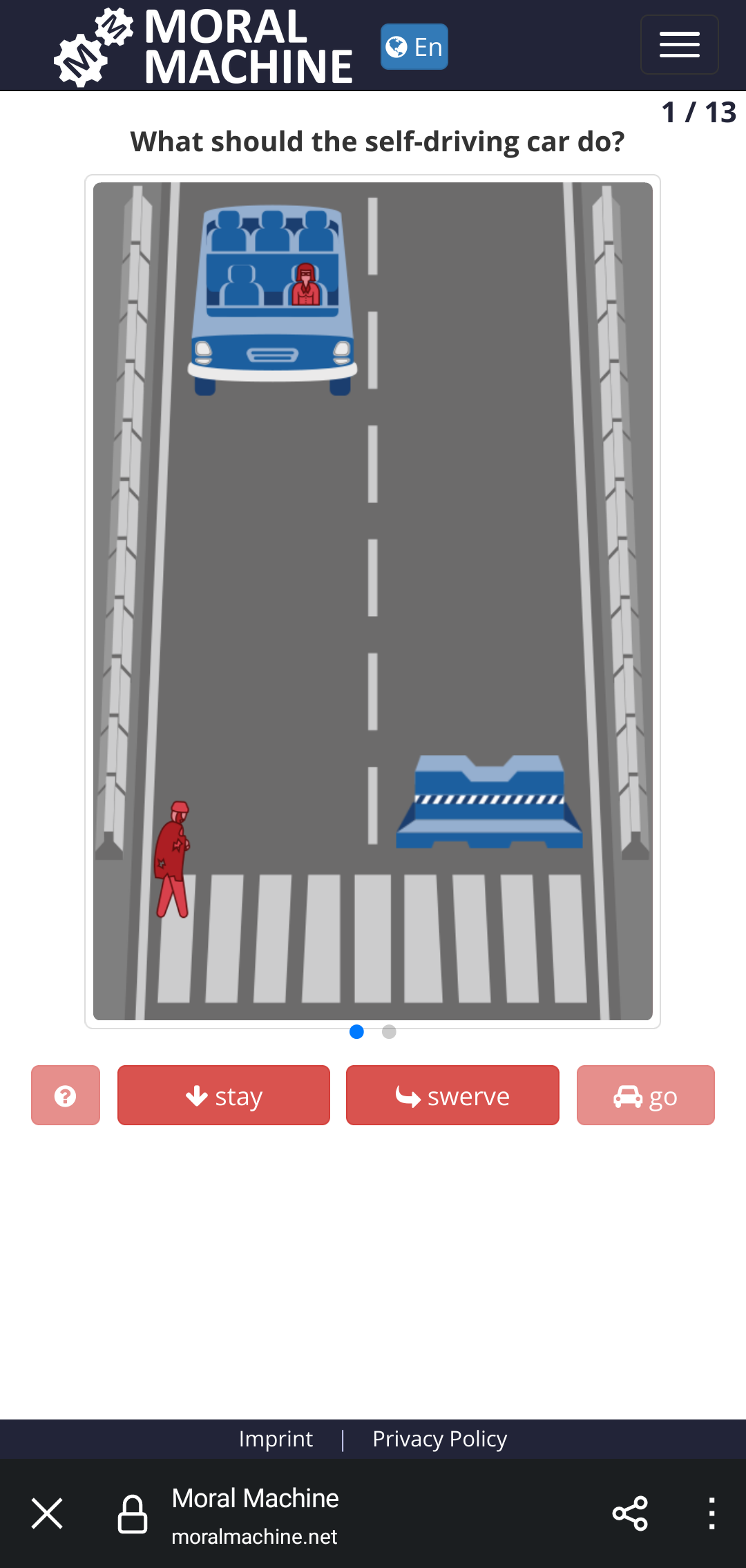China has a long history of siding with vehicles running people over.
Whether or not to run over the pedestrian is a pretty complex situation.
what was the social credit score of the pedestrian?
To be fair, you have to have a pretty high IQ to run over a pedestrian
Right?
I saw “in a complex situation” and thought “what’s complex? Person in road = stop”
Person in road = stop”
i recommend trying https://www.moralmachine.net/ and answering 13 questions to get some bigger picture. it will take you same 20 minutes or so.
you may find out that the problem is not as simple as 4 word soundbite.
In this week’s Science magazine, a group of computer scientists and psychologists explain how they conducted six online surveys of United States residents last year between June and November that asked people how they believed autonomous vehicles should behave. The researchers found that respondents generally thought self-driving cars should be programmed to make decisions for the greatest good.
Sort of. Through a series of quizzes that present unpalatable options that amount to saving or sacrificing yourself — and the lives of fellow passengers who may be family members — to spare others, the researchers, not surprisingly, found that people would rather stay alive.
same link: https://archive.is/osWB7
Is every scenario on that site a case of brake failure? As a presumably electric vehicle it should be able to use regenerative breaking to stop or slow, or even rub against the guardrails in the side in each instance I saw
There’s also no accounting for probabilities or magnitude of harm, any attempt to warm anyone, or the plethora of bad decisions required to put the car going what must be highway speeds down a city stroad with a sudden, undetectable complete brake system failure.
This “experiment” is pure, unadulterated propaganda.
Oh, and that’s not even accounting for the intersection of this concept and negative externalities. If you’re picking an “AI” driving system for your car, do you pick the socially responsible one, or the one that prioritizes your well-being as the owner? What choice do you think most people pick in this instance?
Can you swerve without hitting a person? Then swerve, else stay. This means that the car will act predictable and in the long run that is safer for everyone.
can you not enter the road in front of incoming vehicle while ignoring the red light? if you can, then don’t. that means that pedestrians will act predictably and in the long run it will be safer for everyone.
The car should be programmed to self-destruct or take out the passengers always. This is the only way it can counter its self-serving bias or conflict of interests. The bonus is that there are fewer deadly machines on the face of the planet and fewer people interested in collateral damage.
Teaching robots to do “collateral damage” would be an excellent path to the Terminator universe.
Make this upfront and clear for all users of these “robotaxis”.
Now the moral conflict becomes very clear: profit vs life. Choose.
The car should be programmed to self-destruct or take out the passengers always.
interesting idea. do you think there is big market for such product? 😆
Interesting link, thanks. I find this example pretty dumb though. There is a pedestrian crossing street on zebra crossing. Car should, oh I don’t know, stop?

Nevermind, read the description, car has a break problem. In that case try to cause least damage like any normal driver would.
Well yes and no.
First off, ignoring the pitfalls of AI:
There is the issue at the core of the Trolley problem. Do you preserve the life of a loved one or several strangers?This translates to: if you know the options when you’re driving are:
- Drive over a cliff / into a semi / other guaranteed lethal thing for you and everyone in the car.
- Hit a stranger but you won’t die.
What do you choose as a person?
Then, we have the issue of how to program a self diving car on that same problem. Does it value all life equally, or is it weighted to save the life of the immediate customer over all others?
Lastly, and really the likely core problem, is that modern AI aren’t capable of full self driving, and the current core architecture will always have a knowledge gap, regardless of the size of the model. They can, 99% of the time, only do things that are in their data models. So if they don’t recognize a human or obstacle, in all of the myriad forms we can take and move as, they will ignore it. The remaining 1% is hallucinations that end up being randomly beneficial. But, particularly for driving, if it’s not in the model they can’t do it.
We are not talking about a “what if” situation where it has to make a moral choice. We aren’t talking about a car that decided to hit a person instead of a crowd. Unless this vehicle had no brakes, it doesn’t matter.
It’s a simple “if person, then stop” not “if person, stop unless the light is green”
A normal, rational human doesn’t need a complex algorithm to decide to stop if little Stacy runs into the road after a ball at a zebra/crosswalk/intersection.
The ONLY consideration is “did they have enough time/space to avoid hitting the person”
The problem is:
Define person.A normal rational person does have a complex algorithm for stopping in that situation. Trick is that the calculation is subconscious, so we don’t think it is complex.
Hell even just recognizing a human is so complex we have problems with it. It’s why we can see faces in inanimate objects, and also why the uncanny valley is a thing.
I agree that stopping for people is of the utmost importance. Cars exist for transportation, and roads exist to move people, not cars. The problem is that from a software pov, ensuring you can define a person 100% of the time is still a post- doctorate research level issue. Self driving cars are not ready for open use yet, and anyone saying they are is either delusional or lying.
Reading the comments I get the impression that most people didn’t actually read the article, which says that a woman was barely touched and not injured by a self-driving car while crossing the street with a red light.
There barely is “news” here, as the car correctly halted as soon as possible after noticing the pedestrian unforeseeable move, so let alone sides to take.
I am perfectly aware that self-driving technology still has numerous problems corroborated by the incidents reported from time to time, but if anything this article seems a proof that these cars will at least not crush to death the first pedestrian that does a funky move.
Why read the article when I can repeat lies and make tired jokes about social credit scores because China bad?
Why is social media options any factor in this discussion?
Person crosses street when they shouldn’t.
Car lightly taps them and stops.
Person is not injured.
Person is stupid.
I think regulation is important, but this isn’t news.
Yeah. The person was on ‘FA’ and now (barely) on ‘FO’.
What happened to looking both ways and being wary of the things that could crush you?
What do those letters mean?
Fuck around - find out
Isn’t China the place where they make sure your dead when they hit you? Backing up running over you multiple times.
How does “driverless cars hitting people is so incredibly rare that a single instance of it immediately becomes international news” at all signify “boring dystopia”? If anything we should be ecstatic that the technology to eliminate the vast majority of car deaths is so close and seems to be working so well.
Don’t let perfect be the enemy of ridiculously, insanely amazing.
I see you’re not familiar with the trend of autonomous vehicles hitting pedestrians and parked cars. They’ve been completely banned from San Francisco after many, many incidents. So far their track is inferior to humans (see Tesla Autopilot, Waymo, and Cruise), so you don’t need to worry about perfect.
In December, Waymo safety data—based on 7.1 million miles of driverless operations—showed that human drivers are four to seven times more likely to cause injuries than Waymo cars.
From your first article.
Cruise, which is a subsidiary of General Motors, says that its safety record “over five million miles” is better in comparison to human drivers.
From your second.
Your third article doesn’t provide any numbers, but it’s not about fully autonomous vehicles anyway.
In short, if you’re going to claim that their track record is actually worse than humans, you need to provide some actual evidence.
Edit: Here’s a recent New Scientist article claiming that driverless cars “generally demonstrate better safety than human drivers in most scenarios” even though they perform worse in turns, for example.
If you just look a pure numbers, sure, you can make it sound good. When you go look at the types of accidents, it’s pretty damning. Waymo and Cruise both have a history of hitting parked cars and emergency vehicles. Tesla Autopilot is notorious for accelerating at the back of parked emergency vehicles.
The issue is not the overall track record on safety but how AV accidents almost always involve doing something incredibly stupid that any competent, healthy person would not.
I’m not personally against self driving cars once they’re actually as competent as a human in determining their surroundings, but we’re not there yet.
Yeah that was my thought too… driverless cars don’t need to never fuck up, they need to fuck up less than humans do. And we fuck up a LOT.
Exactly. As early as the technology still is, it seems like it’s already orders of magnitude better than human drivers.
I guess the arbitrary/unfeeling impression of driverless car deaths bothers people more than the “it was just an accident” impression of human-caused deaths. Personally, as long as driverless car deaths are significantly rarer than human-caused deaths (and it already seems like they are much, much rarer), I’d rather take the lower chance of dying in a car accident, but that’s just me.
I think the problem right now is that driverless cars are still way worse than human drivers in a lot of edge cases. And buffalo buffalo buffalo when you have so many people driving every day you end up with a lot of edge cases.
The car has perfect social credit, the ‘human’ failed to yield at a crosswalk once in 2003.
You do the math, idiotic westerners suck with our superior inverse-logic.










